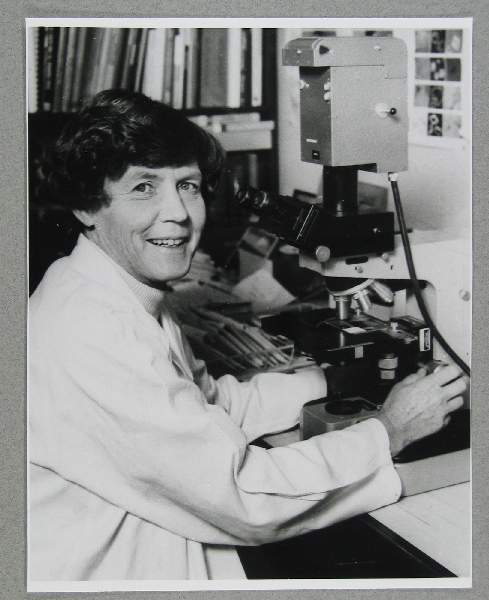Priscilla Kincaid-Smith Oration on Health
The Priscilla Kincaid-Smith Oration on Health honours the life and work of Professor Priscilla Kincaid-Smith AC CBE, and the impact clinician scientists have on health in society.
Professor Priscilla Kincaid-Smith was an internationally renowned specialist in kidney disease, a pioneering leader in research and clinical care, a fearless patient and public health advocate, the first female professor at the University of Melbourne in 1975, and a mentor to many. She is well known for discovering the link between compound analgesics—such as Bex powder and Vincents powder—and kidney damage, and her research on renal disease and efforts to prevent renal failure.
Read more about Priscilla Kincaid-Smith here.
2024 Priscilla Kincaid-Smith Oration on Health
Oration Synopsis
The 2024 oration, titled ‘Empowering women to manage menopause’, was delivered by Professor Martha Hickey. On 6 March 2024, The Lancet launched their first clinical series on menopause, led by Professor Martha Hickey. During her oration, Professor Hickey discussed and how gendered ageism may contribute to negative experiences and called for reduced stigma around menopause and greater recognition of the value and contribution of older women.
About the Orator
Martha Hickey is Professor of Obstetrics and Gynaecology at the University of Melbourne and an NHMRC Leadership (L2) Fellow. Her main clinical and research interests are in menopause. In her clinical practice at The Women’s, she leads Australia’s largest menopause service and established the first multidisciplinary service for managing menopause after cancer, now replicated internationally.
She is an enthusiastic proponent of evidence based medicine, and an Editor for the Cochrane Collaboration. She is the Clinical Expert for the UK National Institute for Health and Care Excellence (NICE) guidelines in menopause, due to report in May 2024. She was invited to lead the first Lancet Clinical Series on Menopause, to be published on International Women’s Day this year.
To ensure women’s voices are heard in menopause research she led the development of the first Core Outcome Set and is leading the global Menopause Priority Setting Partners (MAPS) to set a new, patient-focused research agenda. She is frustrated by the medicalization of menopause and negative portrayal of ageing in women. In 2021 she led the Flesh after Fifty arts and health project aiming to challenge and change this narrative using positive images and stories. Flesh after Fifty has been viewed by over 50,000 people and is still touring.
About Priscilla Kincaid-Smith
Priscilla Kincaid-Smith was a world-renowned nephrologist and a trailblazer for Australian female scientists. Her story is filled with remarkable achievements in science and medicine that defied the gender inequity entrenched in Australian society at the time.
Raised in South Africa, Priscilla migrated to Australia from England in 1958 with dual qualifications as a physician and pathologist. Priscilla overcame barriers that prevented married women from working at a university or hospital in Australia, all while opening doors that were previously closed to women.
Priscilla joined the Australian Medical Association (AMA) and secured research positions at the University of Melbourne and Baker Institute. She was also made an Honorary Physician at the Queen Victoria Hospital.
After several years, Priscilla was appointed Director of Nephrology—a speciality that did not exist during her training—at the Royal Melbourne Hospital, where she served for almost 25 years before taking up the same position at Epworth Hospital. She also worked as a Physician in Nephrology at the Royal Women’s Hospital for 15 years.
Priscilla achieved an extraordinary series of firsts throughout her career. She became the first female Professor at the University of Melbourne and Faculty in 1975, the first female President of the Royal Australasian College of Physicians in 1986, the first female Chair of the AMA in 1990, the first Recipient of the AMA’s Woman in Medicine award, and the first female and Australian Chair of the World Medical Association in 1994.
Priscilla’s most important medical accomplishment came from discovering the link between compound analgesics—such as Bex powder and Vincents powder—and kidney disease in the early 1960s. This was the second prevalent cause of end-stage renal failure in Australia at this time and affected women the most, as these painkillers were predominantly marketed towards women.
She spent years working on recognising the epidemic, defining the nature of the disease, conducting experimental studies, and lobbying for restrictions on the availability of analgesics. This work played a significant role in bringing about policy change, and by 1977 these analgesics were banned in Australia.
Priscilla was also recognised as a pioneer for her research on renal disease and efforts to prevent renal failure, including setting up the renal transplant unit at the Royal Melbourne Hospital.
Priscilla was an outstanding figure In Australia and internationally. She established strong links with international organisations, including serving as the President of the World Medical Association and the International and Australasian Societies of Nephrology.
Her work was driven by a strong belief that doctors should actively engage with governments to deliver and improve health services. She was a persistent leader for women and a strong advocate on health issues beyond her speciality area, such as the availability of safe abortions. Priscilla was appointed Commander of the Order of the British Empire for services to medicine in 1975 and inducted into the Victorian Honour Roll of Women in 2001.
Priscilla Kincaid-Smith’s significant accomplishments over her lifetime laid the groundwork for future generations of female medical practitioners, but she also achieved so much more beyond this. She was an extraordinary figure whose work as a physician, researcher and leader advanced Australia’s position, and the University and Faculty’s position, within the international medical community.